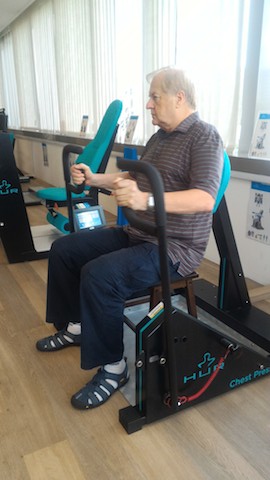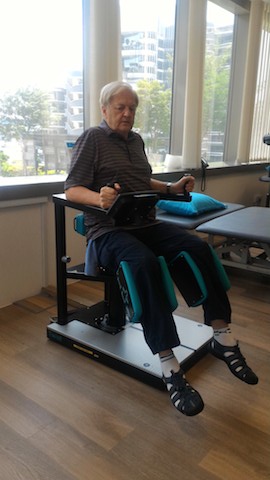“Working it out”
Singapore Cancer Society’s Cancer Rehabilitation Centre allows those like Mike Rollings to improve their physical wellness and much more.
Mike Rollings, 67, had a fast-paced and often stressful life working as a chemical engineer for 44 years. Originally from the UK, the Singapore permanent resident travelled frequently around Southeast Asia working on various projects as well as spending many hours sitting behind an office desk.
His job and lifestyle took a toll and in 2013, he was diagnosed with prostate cancer. Following surgery to remove his prostate, it was several weeks before he could travel or do any heavy lifting. Unfortunately, nine months later, he required salvage radiotherapy and during that period he lost a lot of weight. Hormone treatment was necessary soon after that, and all this took a physical toll on his body.
Not surprisingly, there was also a psychological toll – with the use of hormone therapy, there are a number of adverse side effects including fatigue, hot flashes and mood swings. As Mike is undergoing what is known as ‘intermittent hormone therapy’, he has been able to give his body a break from hormone injections over the past year, although the side effects can take several months to wear off. However, his PSA level (Prostate-Specific Antigen which is a protein produced by cells of the prostate gland) has started to rise again and he will need to restart these injections soon. Mike hopes the intermittent hormone treatment will be able to keep his cancer in control for many years to come.
At around the time he was doing his initial hormone treatment, Mike was introduced to the Singapore Cancer Society’s (SCS) support group, Walnut Warriors, which was set up for prostate cancer patients and survivors. He has found many benefits sharing with this community of survivors who are facing similar journeys. And, when the SCS Cancer Rehabilitation Centre opened at the end of 2015 (it was officially launched in October this year), he jumped at the opportunity to join the Centre’s Next Step programme for survivors, which focuses on keeping them fit and improving their physical wellness.
Keeping fit
After several months on the programme and guided by SCS therapists, Mike felt healthier and fitter than before his prostate cancer diagnosis. Currently, he spends some time in the rehab centre’s gym using machines aimed at muscle strength and flexibility, and on Thursdays he meets other Walnut Warriors for a Man Plan exercise class – a one-hour routine using resistance bands. This programme has been found to reduce fatigue, and improve muscular fitness and quality of life, particularly for prostate cancer patients undergoing hormone treatment. On Friday mornings, he enjoys two to three hours walking around Singapore’s parks and reserves with some of his buddies from the support group, all of which adds to improving his health and his positive frame of mind.
He also joined a four-week art therapy class, which helps put patients in touch with their feelings, and understand and bond with other cancer survivors in the group, and he attended a number of talks at the Centre including nutrition and food labeling. Mike shared: “This has helped me understand what is healthy and what to look out for when buying food products. This is particularly important for people on hormone treatment because of risks such as osteoporosis and diabetes.”
Mike has found the SCS cancer rehab gym particularly important in building muscle mass and improving his flexibility. He said he hadn’t realised just how stiff his lower spine was until working out on the exercise machines. The grandfather of two shared: “Diet, exercise, psychological support and sleep are very important for anyone on a cancer journey. The support I get from my family and the SCS Walnut Warriors ensures I stay positive and motivated to move on. Treatment is about staying alive. Family and friends are about living. I feel good.”
Currently semi-retired, Mike keeps busy by taking on an occasional work project. He is also the vice-chairman of the Walnut Warriors and provides support as an SCS Patient Ambassador to other prostate cancer survivors. “I find sharing the cancer journey helps me cope with future uncertainties whilst helping others on their own journey where possible,” he said.
SCS Cancer Rehabilitation Centre
The SCS Cancer Rehabilitation Centre at JEM Office Tower in Jurong East was established based on recommendations by the SCS Cancer Rehabilitation Task Force, which identified a pressing need for rehabilitation services in the community.
In 2014, SCS and the National University Hospital (NUH) conducted surveys to understand the rehabilitation needs of those living with and beyond cancer. Results showed that 87 percent of patients suffer lifelong, life-impairing changes in their physical abilities as a result of the disease and its treatment. Of these, only 46 percent of patients and survivors sought physical rehabilitative treatment. Additionally, 44 percent shared that they would not undergo hospital-based rehabilitation even if it were necessary. Amongst these, a significant proportion cited difficulty with transport (43 percent) and high costs (31 percent) as two major hurdles. In a separate survey by SCS, 79 percent of respondents agreed that the rehabilitation centre’s location was another key consideration.
At that time, specialised cancer rehabilitation services and programmes were limited to hospitals. As a result, most patients and survivors either did not receive sufficient follow-up rehabilitation care after being discharged from hospitals, or did not embark on such a programme despite knowledge of the benefits of early rehabilitation.
With a person-centred and holistic approach towards rehabilitation, services and programmes offered at the Centre provide cancer patients and survivors with the essential support needed to surmount physical, emotional, psychological, spiritual and social challenges brought on by cancer. In additional to physio and occupational therapy, those living with and beyond cancer may request for counselling services or join other programmes that help to enhance their quality of life. These include enrichment workshops, nutrition counselling, music or art therapy, and social activities.
SCS also offers two programmes designed to help cancer patients and survivors address specific issues and challenges faced in different phases of their recovery journey. Besides Next Step programme that Mike joined, the Centre offers Specialised Rehabilitation Programme, which caters to clients’ specific physical issues. Therapists work closely with them to address these challenges and clients receive nutrition consultation and psychosocial support while in the programme. There are currently 52 clients enrolled in Specialised Rehabilitation Programme and 48 in Next Step Programme. Rehabilitation services at the Centre are free, and there is only a nominal 12-month membership fee of S$50 for participants who are enrolled in anyone of the rehab programmes.
Besides the full suite of services which also includes peer support groups, participants have physician support – a rarity, if at all present in other day rehabilitation centres. During the course of rehabilitation, progress reports for Specialised Rehabilitation Programme clients are promptly shared with referring hospitals or physicians to enable ongoing calibrations in their treatment. Next Step clients receive quarterly updates on their fitness programme.
Another important group that the SCS Cancer Rehabilitation Centre caters to is caregivers. There are training programmes for caregivers to equip them with the knowledge and skills that will help them in their caregiving journey for their loved ones.



0 Comments